- Home
- Mack Reynolds
Planetary Agent X Page 2
Planetary Agent X Read online
Page 2
“He seemed to get around,” Ronny Bronston said.
“And so does this namesake of his. We’ve been trying to catch up with him for some twenty years. How long before that he was active, we have no way of knowing. It was some time before we became aware of the fact that half the revolts, rebellions, revolutions and such that occur in the United Planets have his dirty finger stirring around in them.”
“But you said some department members don’t believe in his existence.”
Metaxa grunted. “They’re working on the theory that no one man could do all that Tommy Paine has laid to him. Possibly it’s true that he sometimes gets the blame for accomplishments not his. Or, for that matter, possibly he’s more than one person. I don’t know.”
“Well,” Ronny said hesitantly, “what’s an example of his activity?”
Metaxa picked up another report from the confusion of his desk. “Here’s one only a month old. Dictator on the planet Megas. Kidnapped and forced to resign. There’s still confusion, but it looks as though a new type of government will be formed now.”
“But how do they know it wasn’t just some dissatisfied citizens of Megas?”
“It seems as though the kidnap vehicle was an old fashioned Earth-type helicopter. There were no such on Megas. So Section G suspects it’s a possible Tommy Paine case. We could be wrong, of course. That’s why I say the man’s in the way of being a legend. Perhaps the others are right and he doesn’t even exist. I think he does—and if so, it’s our job to get him and put him out of circulation.”
Ronny said slowly, “But why would that come under our jurisdiction? It seems to me that it would be up to the police of whatever planet he was on.”
Ross Metaxa looked thoughfully at his brown bottle, shook his head and returned it to its drawer. He looked at a desk watch. “Don’t read into the United Planets organization more than there is. It’s a fragile institution with practically no independent powers to wield. Every member planet is jealous of its prerogatives, which is understandable. It’s no mistake that Articles One and Two are the basic foundations of the Charter. No member planet wants to be interfered with by any other or by United Planets as an organization. They want to be left alone.
“Within our ranks we have planets with every religion known to man throughout the ages. Everything ranging from primitive animism to the most advanced philosophic ethic. We have every political system ever dreamed of, and every socio-economic system. It can all be blamed on the crackpot manner in which we’re colonizing. Any minority, no matter how small—religious, political, racial, or whatever—if it can collect the funds to buy or rent a spacecraft, can dash off on its own, find a new Earth-type planet and set up in business.
“Fine. One of the prime jobs of Section G is to carry out, to enforce, Articles One and Two of the Charter. A planet with Buddhism as its state religion doesn’t want some diehard Baptist missionary stirring up controversy. A planet with a feudalistic socio-economic system doesn’t want some hotshot interplanetary businessman coming in with some big deal that would eventually cause the feudalistic nobility to be tossed onto the ash heap. A planet with a dictatorship doesn’t want subversives from some democracy trying to undermine their institutions—and vice versa.”
“And it’s our job to enforce all this, eh?” Ronny said.
“That’s right,” Metaxa told him sourly. “It’s not always the nicest job in the system. However, if you believe in United Planets, an organization attempting to coördinate, in such a manner as it can, the efforts of its member planets, for the betterment of all, then you must accept Section G and Interplanetary Security.”
Ronny Bronston thought about it.
Metaxa added, “That’s why one of the requirements of this job is that you yourself be a citizen of United Planets, rather than of any individual planet, have no religious affiliations, no political beliefs, and no racial prejudices. You’ve got to be able to stand aloof.”
“Yeah,” Ronny said thoughtfully.
Ross Metaxa looked at his watch again and sighed wearily. “I’ll turn you over to one of my assistants,” he said. “I’ll see you again, though, before you leave.”
“Before I leave?” Ronny said, coming to his feet. “But where do I start looking for this Tommy Paine?”
“How the hell would I know?” Ross Metaxa growled.
II
In the outer office, Ronny said to the receptionist, “Commissioner Metaxa said for me to get in touch with Sid Jakes.”
She said, “I’m Irene Kasansky. Are you with us?”
Ronny said, “I beg your pardon?”
She said impatiently, “Are you going to be with the Section? If you are, I’ve got to clear you with your old job. You were in statistics over in New Copenhagen, weren’t you?”
Somehow it seemed far away now, the job he’d held for more than five years. “Oh, yes,” he said. “Yes, Commissioner Metaxa has given me an appointment.”
She looked up at him. “Probably to look for Tommy Paine.”
He was taken aback. “That’s right. How did you know?”
“There was talk. This Section is pretty well integrated.” She grimaced, but on her it looked good. “One big happy family. High interdepartmental morale. That sort of nonsense.” She flicked some switches. “You’ll find Supervisor Jakes through that door, one to your left, two to your right.”
He could have asked one what to his left and two what to his right, but evidently Irene Kasansky thought he had enough information to get him to his destination. She’d gone back to her work.
It was one turn to his left and two turns to his right. The door was lettered simply SIDNEY JAKES. He knocked and a voice shouted happily, “It’s open. It’s always open.”
Supervisor Jakes was as informal as his superior. His attire was on the happy-go-lucky side, more suited for sports wear than a fairly high ranking job in the ultra-staid Octagon.
He couldn’t have been much older than Ronny Bronston, but he had a nervous vitality about him that would have worn out the other in a few hours. He jumped up and shook hands. “You must be Bronston. Call me Sid.” He waved a hand at a typed report he’d been reading. “Now I’ve seen them all. They’ve just applied for entry to United Planets. Republic. What a name, eh?”
“What?” Ronny said.
“Sit down, sit down.” He rushed Ronny to a chair, saw him seated, returned to the desk and flicked an order box switch. “Irene,” he said, “do up a badge for Ronny, will you? You’ve got his code, haven’t you? Good. Send it over. Bronze, of course.”
Sid Jakes turned back to Ronny and grinned at him. He motioned to the report again. “What a name for a planet. Republic. Bunch of screwballs, again. Out in the vicinity of Sirius. Based their system on Plato’s Republic. Have to go the whole way. Don’t even speak Basic. Certainly not. They speak Ancient Greek. That’s going to be a neat trick, finding interpreters. How’d you like the Old Man?”
Ronny said, dazed at the conversational barrage, “Old Man? Oh, you mean Commissioner Metaxa.”
“Sure, sure,” Sid grinned, perching himself on the edge of the desk. “Did he give you that drink of tequila during working hours routine? He’d like to poison every new agent we get. What a character.”
The grin was infectious. Ronny said carefully, “Well, I did think his method of hiring a new man was a little—cavalier.”
“Cavalier, yet,” Sid Jakes chortled. “Look, don’t get the Old Man wrong. He knows what he’s doing.”
“But he took me on after only two or three minutes conversation.”
Jakes cocked his head to one side. “Oh? You think so? When did you first apply for interplanetary assignment, Ronny?”
“I don’t know, about three years ago.”
Jakes nodded. “Well, depend on it, you’ve been under observation for that length of time. At any one period, Section G is investigating possibly a thousand potential agents. We need men but qualifications are high.”
He
hopped down from his position, sped around to the other side of the desk and lowered himself into his chair. “Don’t get the wrong idea, though. You’re not in. You’re on probation. Whatever the assignment the Old Man gave you, you’ve got to carry it out successfully before you’re full fledged.” He flicked the order-box switch and said, “Irene, where the devil’s Ronny’s badge?”
Ronny Bronston heard the office girl’s voice answer snappishly.
“All right, all right,” Jakes said. “I love you, too. Send it in when it comes.” He turned to Ronny. “What is your assignment?”
“He wants me to go looking for some firebrand nicknamed Tommy Paine. I’m supposed to arrest him. The commissioner said you’d give me details.”
Sid Jakes’ face went serious. He puckered up his lips. “Wow, that’ll be a neat trick to pull off,” he said. He flicked the order-box switch again. Irene’s voice snapped something before he could say anything and Sid Jakes grinned and said, “O.K., O.K., darling, but if this is the way you’re going to be I won’t marry you. Then what will the children say? Besides, that’s not what I called about. Have ballistics do up a model H gun for Ronny, will you? Be sure it’s adjusted to his code.”
He flicked off the order-box and turned back to Ronny. “I understand you’re familiar with hand guns. It’s in this report on you.”
Ronny nodded. He was just beginning to adjust to this free-wheeling character. “What will I need a gun for?”
Jakes laughed. “Ye Gods, you babe in the woods. Do you realize this Tommy Paine character has supposedly stirred up a couple of score wars, revolutions and revolts? Not to speak of having laid in his lap two or three dozen assassinations. He’s a quick lad with a gun. A regular Nihilist.”
“Nihilist?”
Jakes chuckled. “When you’ve been in this Section for a while, you’ll be familiar with every screwball outfit man has ever dreamed up. The Nihilists were a European group, mostly Russian, back in the Nineteenth Century. They believed that by bumping off a few Grand Dukes and a Czar or so they could force the ruling class to grant reforms. Sometimes they were pretty ingenious. Blew up trains, that sort of thing.”
“Look here,” Ronny said, “what motivates this Paine fellow? What’s he get out of all this trouble he stirs up?”
“Search me. Nobody seems to know. Some think he’s a mental case. For one thing, he’s not consistent.”
“How do you mean?”
“Well, he’ll go to one planet and break his back trying to overthrow, say, feudalism. Then, possibly after being successful, he goes to another planet and devotes his energies to establishing the same socio-economic system.”
Ronny assimilated that. “You’re one of those who believes he exists?”
“Oh, he exists, all right, all right,” Sid Jakes said happily. “Matter of fact, I almost ran into him a few years ago.”
Ronny leaned forward. “I guess I ought to know about it. The more information I have, the better.”
“Sure, sure,” Jakes said. “This deal of mine was on one of the Aldebaran planets. A bunch of nature boys had settled there.”
“Nature boys?”
“Yeah. Back to nature. The trouble with the human race is that it’s got too far away from nature. So a whole flock of them landed on this planet. They call it Mother, of all things. They landed and set up a primitive society. Absolute stone age. No metals. Lived by the chase and by picking berries, wild fruit, that sort of thing. Not even any agriculture. Wore skins. Bows and arrows were the nearest thing they allowed themselves in the way of mechanical devices.”
“Good grief,” Ronny said.
“It was a laugh,” Jakes told him. “I was assigned there as Section G representative with the UP organization. Picture it. We had to wear skins for clothes. We had to confine ourselves to two or three long houses. Something like the American Iroquois lived in before Columbus. Their society on Mother was based on primitive communism. The clan, the phratry, the tribe. Their religion was mostly a matter of knocking into everybody’s head that any progress was taboo. Oh, it was great.”
“Well, were they happy?”
“What’s happiness? I suppose they were as happy as anybody ever averages. Frankly, I didn’t mind the assignment. Lots of fishing, lots of hunting.”
Ronny said, “Well, where does Tommy Paine come in?”
“He snuck up on us. Started way back in the boondocks away from any of the larger primitive settlements. Went around putting himself over as a holy man. Cured people of various things from gangrene to eye diseases. Given antibiotics and such, you can imagine how successful he was.”
“Well, what harm did he do?”
“I didn’t say he did any harm. But in that manner he made himself awfully popular. Then he’d pull some trick like showing them how to smelt iron, and distribute some corn and wheat seed around and plant the idea of agriculture. The local witch doctors would try to give him a hard time, but the people figured he was a holy man.”
“Well, what happened finally?” Ronny wasn’t following too well.
“Communications being what they were, before he’d been discovered by the central organization—they had a kind of Council of Tribes which met once a year—he’d planted so many ideas that they couldn’t be stopped. The young people’d never go back to flint knives, once introduced to iron. We went looking for friend Tommy Paine, but he got wind of it and took off. We even found where he’d hidden his little space cruiser. Oh, it was Paine, all right, all right.”
“But what harm did he do? I don’t understand,” Ronny scowled.
“He threw everything on its ear. Last I heard, the planet had broken up into three main camps. They were whaling away at each other like the Assyrians and Egyptians. Iron weapons, chariots, domesticated horses. Agriculture was sweeping the planet. Population was exploding. Men were making slaves out of each other, to put them to work. Oh, it was a mess from the viewpoint of the original nature boys.”
A red light flickered on his desk and Sid Jakes opened a delivery drawer and dipped his hand into it. It emerged with a flat wallet. He tossed it to Ronny Bronston.
“Here you are. Your badge.”
Ronny opened the wallet and examined it. He’d never seen one before, but for that matter he’d never heard of Section G before that morning. It was a simple enough bronze badge. It said merely, Ronald Bronston, Section G, Bureau of Investigation, United Planets.
Sid Jakes explained. “You’ll get cooperation with that through the Justice Department anywhere you go. Well brief you further on procedure during indoctrination. You in turn, of course, are to cooperate with any other agent of Section G. You’re under orders of anyone with”—his hand snaked into a pocket and emerged with a wallet similar to Ronny’s—“a silver badge, carried by a First Grade Agent, or a gold one of Supervisor rank.”
Ronny noted that his badge wasn’t really bronze. It had a certain sheen, a brightness.
Jake said, “Here, look at this.” He tossed his own badge to the new man. Ronny looked down at it in surprise. The gold had gone dull.
Jakes laughed. “Now give me yours.”
Ronny got up and walked over to him and handed it over. As soon as the other man’s hand touched it, the bronze lost its sheen.
Jakes handed it back. “See, it’s tuned to you alone,” he said. “And mine is tuned to my code. Nobody can swipe a Section G badge and impersonate an agent. If anybody ever shows you a badge that doesn’t have its sheen, you know he’s a fake. Neat trick, eh?”
“Very neat,” Ronny admitted. He returned the other’s gold badge. “Look, to get back to this Tommy Paine.”
But the red light flickered again and Jakes brought forth from the delivery drawer a hand gun complete with shoulder harness. “Nasty weapon,” he said. “But we’d better go on down to the armory and show you its workings.”
He stood up. “Oh, yes, don’t let me forget to give you a communicator. A real gizmo. About as big as a woman’s vanity case. P
uts you in immediate contact with the nearest Section G office, no matter how near or far away it is. Or, if you wish, in contact with our offices here in the Octagon. Very neat trick.”
He led Ronny Bronston from his office and down the corridors beyond to an elevator. He said happily, “This is a crazy outfit, this Section G. You’ll probably love it. Everybody does.”
III
Ronny learned to love Section G—in moderation.
He was initially taken aback by the existence of the organization at all. He’d known, of course, of the Department of Justice and even of the Bureau of Investigation, but Section G was hush-hush and not even United Planets publications ever mentioned it.
The problems involved in remaining hush-hush weren’t as great as all that. The very magnitude of the UP, which involved more than two thousand member planets, allowed for departments and bureaus hidden away in the endless stretches of red tape.
In fact, although Ronny Bronston had spent the better part of his life thus far in studying for a place in the organization, and then working in the Population Statistics Department for some years, he was only now beginning to get the overall picture of the workings of the mushrooming, chaotic United Planets organization.
It was Earth’s largest industry by far. In fact, for all practical purposes it was her only major industry. Tourism, yes, but even that, in a way, was related to the United Planets organization. Millions of visitors whose ancestors had once emigrated from the mother planet streamed back in racial nostalgia. Streamed back to see the continents and oceans, the Arctic and the Antarctic, the Amazon River and Mount Everest, the Sahara and New York City, the ruins of Rome and Athens, the Vatican, the Louvre and the Hermitage.
But the populace of Earth, in its hundreds of millions, were largely citizens of United Planets and worked in the organization and with its auxiliaries such as the Space Forces.

 Happy Ending
Happy Ending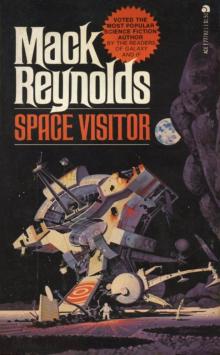 Space Visitor
Space Visitor A Kiss Before Loving
A Kiss Before Loving Episode on the Riviera
Episode on the Riviera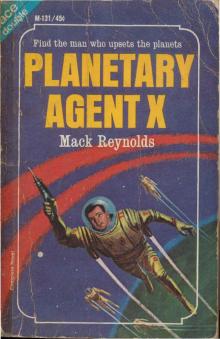 Planetary Agent X
Planetary Agent X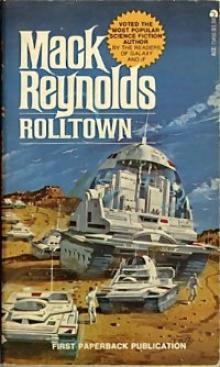 Rolltown bh-3
Rolltown bh-3 The Second Mack Reynolds Megapack
The Second Mack Reynolds Megapack Dawnman Planet up-2
Dawnman Planet up-2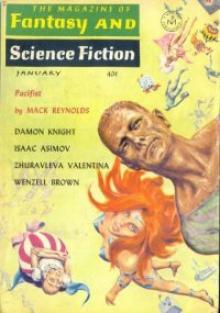 Pacifist
Pacifist The Other Time
The Other Time Once Departed
Once Departed IQ
IQ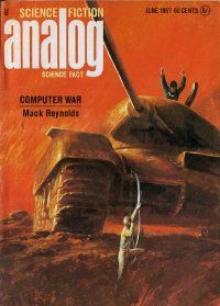 Computer War
Computer War Earth Unaware
Earth Unaware The Rival Rigelians up-3
The Rival Rigelians up-3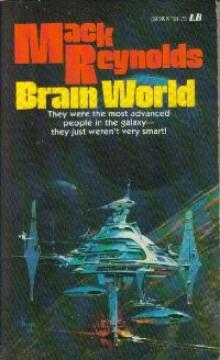 Brain World up-7
Brain World up-7 Star Trek - TOS - Mission to Horatius
Star Trek - TOS - Mission to Horatius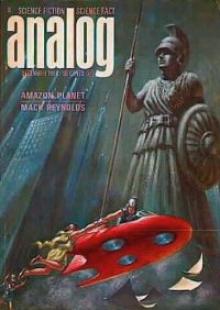 Amazon Planet up-5
Amazon Planet up-5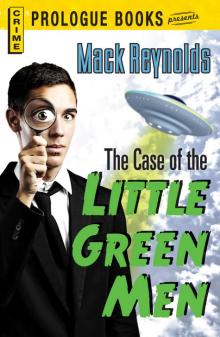 The Case of the Little Green Men
The Case of the Little Green Men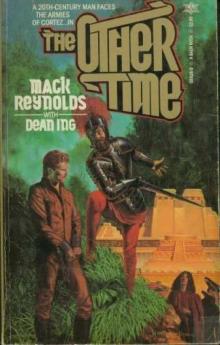 Other Time
Other Time The Mack Reynolds Megapack
The Mack Reynolds Megapack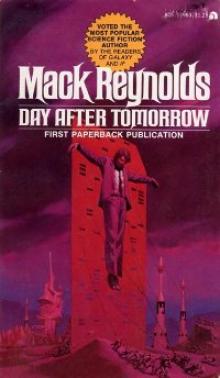 Day After Tomorrow
Day After Tomorrow The Devils & Demons MEGAPACK ®: 25 Modern and Classic Tales
The Devils & Demons MEGAPACK ®: 25 Modern and Classic Tales Mission to Horatius
Mission to Horatius Ability Quotient
Ability Quotient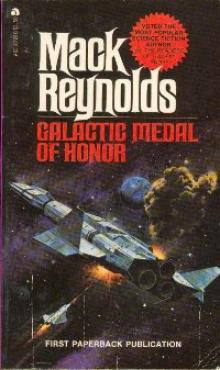 Galactic Medal of Honor
Galactic Medal of Honor Trojan Orbit
Trojan Orbit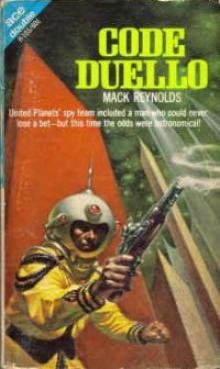 Code Duello up-4
Code Duello up-4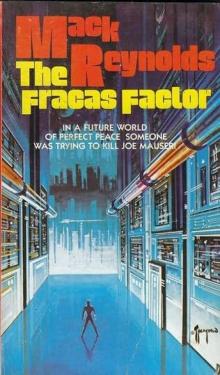 The Fracas Factor
The Fracas Factor The Second Pulp Crime
The Second Pulp Crime Deathwish World
Deathwish World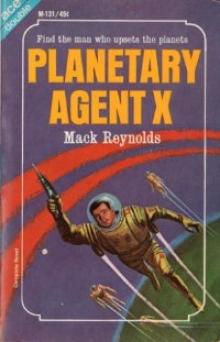 Planetary Agent X up-1
Planetary Agent X up-1 Blackman' Burden na-1
Blackman' Burden na-1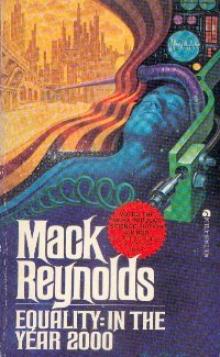 Equality: In the Year 2000 jw-2
Equality: In the Year 2000 jw-2 The Best Ye Breed na-3
The Best Ye Breed na-3 The Jet Set
The Jet Set The Rival Rigelians
The Rival Rigelians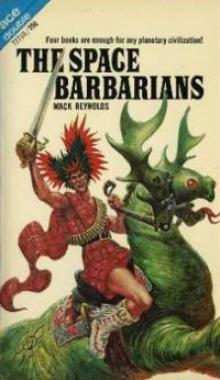 The Space Barbarians
The Space Barbarians